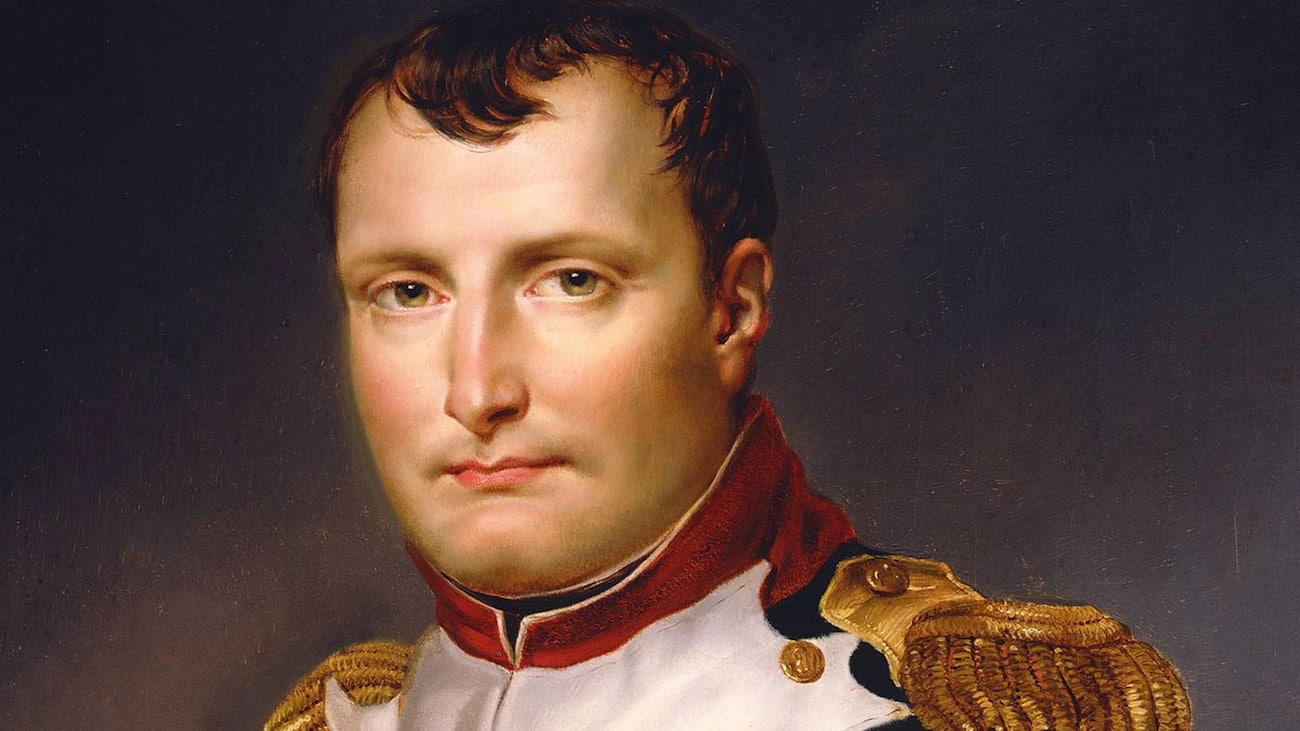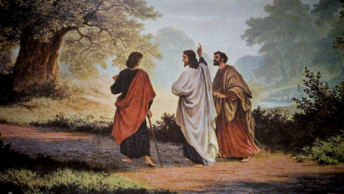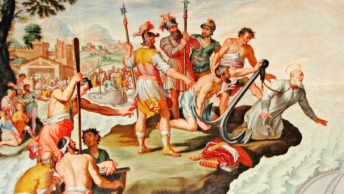If we wanted to point to an important historical figure who had a love/hate relationship with the Catholic Church, Napoleon Bonaparte would be a good choice. At the height of his power, one of his generals asked him when he had been happiest, and he responded, “The day of my First Communion was the happiest day of my life. . . ,” and in his will, he declared, “I die in the Apostolic and Roman Faith, in whose bosom I was born more than fifty years ago.” During much of his life, however, Napoleon worked to undermine the authority of the Church, and in particular, he treated the Pope with a shocking lack of respect. In 1804, Napoleon insisted Pope Pius VII come to Paris to crown him as emperor; when the Pope arrived, he was snubbed and insulted in various ways. During the coronation ceremony, Napoleon arrogantly took the crown from the Pope’s hands and placed it on himself. Afterwards he tried to bully Pius VII into moving the papacy to Paris, so as to allow Napoleon to dominate the Church; the Pope refused this demand by saying, “How well you act comedy.” Enraged, the French emperor took a drawing of St. Peter’s in Rome and tore it to pieces, declaring, “This is what I shall do to the Church—I will crush her utterly.” To this, Pius VII calmly replied, “Now you act tragedy.”
A few years later, in 1809, Napoleon seized the Papal States—the territory in central Italy belonging to the Church. From that moment the tide turned against him; four days later, he suffered his first major defeat in battle, and the nations of Europe took heart over the idea that Napoleon was not invincible. Later the emperor had Pius arrested, causing the Pope to excommunicate him. Napoleon scoffed, “Does he suppose the [weapons] will fall from the hands of my soldiers?” However, exactly that happened during his disastrous invasion of Russia; forced to retreat during the brutal Russian winter, many soldiers became so weak or cold they could no longer carry or hold onto their guns. Napoleon was eventually defeated and sent into exile—first at the Mediterranean island of Elba, from which he briefly escaped, and then on the remote South Atlantic island of St. Helena. He sometimes amused himself by complaining about the Church and pretending any religion was superior to Catholicism, but he also begged the Pope to send him a Catholic chaplain, while also praising Jesus Christ as truly divine, and stating that “The nations of the earth pass away, and thrones fall to the ground; the Church alone remains.” Napoleon learned the hard way that Our Lord’s promise to Peter is utterly reliable. No one, and nothing, will ever overcome the Church—and if we have a living faith in Jesus, this same promise of ultimate victory is also extended to us.
In his Letter to the Romans (11:33-36), St. Paul speaks of “the depth of the riches and wisdom and knowledge of God,” telling us that His judgments are beyond our comprehension, and His power is beyond our imagining. That being the case, it makes perfect sense to rely upon the Lord and do His will. In the Book of Isaiah (22:19-23), Shebna—a corrupt royal official some 700 years before Christ—failed to do this, and so he was replaced by Eliakim, a humble man who was a true servant of God and the people. He was given power and authority, and exercised it successfully, showing that genuine greatness comes from obeying the Lord. St. Peter, despite his many failings, is a perfect example. He was often weak, impetuous, stubborn, and slow to understand—but Jesus chose him anyhow. The leader of the apostles did have his failures—especially when he denied Jesus three times—but he was humble enough to seek forgiveness and then rely upon God’s grace. Through the power of the Holy Spirit, St. Peter and the other apostles, and their successors, accomplished their mission—far more spectacularly than either the world or they themselves would ever have imagined.
If I were to ask, “How many of us are weak and sinful?,” the honest answer would be “All of us.” If I were then to ask, “How many of us can God use in helping bring about His Kingdom?,” again the correct answer would be “All of us.” God’s grace is greater than our sinfulness, and His perfection is greater than our weakness. The history of the Church provides many illustrations of this. There have been, unfortunately, many ambitious and worldly popes, cardinals, and bishops, and many immoral priests and laypersons, throughout the centuries, and even today we hear of various scandals, failures, and betrayals. Any other institution would have collapsed long ago, but the Church continues because of the presence of her Lord and Master—and through Him, she remains a source and sign of salvation and grace. This is not an excuse for us to grow complacent or stop trying to overcome our sins; rather, it’s a reason for us to hope and to believe that our faith makes a difference.
Someone might say, “I’m not really all that special—how can God use me? I’m only one person—what can I do?” The proper response is simple: be yourself—and in so doing, be the best person you can be. Put your relationship with God first—and everything else will fall into place. Try to see Jesus in other people—and do your best to let them see Him in you. Admit your sins, and seek God’s forgiveness; admit your weakness, and seek His help. When you see people doing what’s right, praise and support them; when you see others struggling in their weakness, help and encourage them. If you’re asked to volunteer for something, seriously consider it; if you have a talent or ability, share it. Pray for the people who need your prayers; pray for the people who don’t deserve your prayers. Look for the good in others; be quicker to praise and compliment than to criticize or blame. Appreciate all the people in your life, and try not to take them for granted—especially those you work with and live with.
These are simple things all of us can do, in spite of our own sins and weaknesses; these are practical ways of following Jesus, of sharing in the mission of His Church, and of showing allegiance to the successors of St. Peter and the other apostles. As the great and ambitious emperor Napoleon was forced to acknowledge, no worldly or spiritual power can in the end overcome the Church—and if we do our best to live as faithful Catholics, we too will be able to successfully resist evil, conquer the challenges of this life, and ultimately share in Christ’s eternal triumph.








